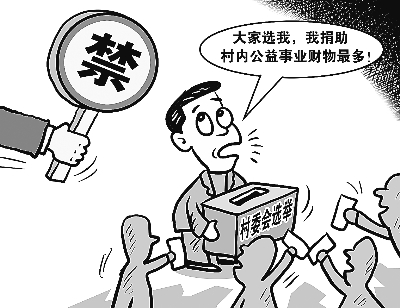Bribery being bred in grassroots elections
|
|
| File photo. Bribery has infested the grassroots elections of the Party's branches and the villagers' self-governing bodies in South China's Hainan province, and the price to buy a vote has risen to a record price, an investigation has found. |
Bribery has infested the grassroots elections of the Party's branches and the villagers' self-governing bodies in South China's Hainan province, and the price to buy a vote has risen to a record price, an investigation has found.
Residents in some villages of the Xiuying district in Haikou city, the provincial capital, said candidates to the villages' Party branch and the villagers' self-governing committee now have to pay as much as 1,200 yuan ($177) to each voter in exchange for their support at the ballot box, the Procuratorial Daily reported, citing an investigation conducted by the provincial prosecutors.
The price of a bribed vote has skyrocketed, especially compared to the tiny sum of 10 to 15 yuan in the past, the report said.
Local prosecutors found the villages undertaking projects that are likely to attract investment or property development are more likely to breed bribery. The bribing varies from giving money to providing entertainment to the voters.
The tendency is so rampant that the heads of more than half of the 18 villages or communities in Longquan township of Haikou were elected after providing money for votes or feting the voters, said an unidentified township leader.
The investigation also disclosed that clannish behavior and favoritism to blood relations make a substantial influence on the outcome of elections in some places.
Moreover, in some cases, local hooligans and gangsters even used violence to intimidate the villagers to vote for a particular candidate.
Some witches or fortune tellers have also become involved in the elections. The so-called prophets told some villagers that if they did not vote for the "heaven-chosen" candidates, their families would be afflicted with misfortunes, the report said.
A spate of conflicts has ensued as a result of the manipulated elections, according to the investigation.
Some outgoing village heads who were angry about not being re-elected allegedly refused to hand over village documents or the village's official seals and, in some cases, even destroyed them.
Verbal conflicts have also occurred between those elected and the losing candidates or their predecessors. The elections' lawfulness and procedural justice are the most debated, the report added.
There is a feeling among a handful of the local villagers that "whoever gets elected will eventually become corrupt, so just choose the one with the highest bid," some earlier reports said.
"This sentiment actually makes sense under the current electoral system," said Tong Zhihui, a professor at the school of agricultural economics and rural development, Renmin University of China.
"The government puts too much emphasis on the form of the election than its substance. Self-governance is the true essence of grassroots democracy. Overemphasizing the practice and ignoring the essence will, more or less, lead to some imperfections, including the vote-buying phenomenon," he said.
"In order to uproot the practice, the governments and legislative bodies shall advance the education of self-governance to the ordinary villagers and establish an effective system, which includes administrative as well as legal mechanisms, to confine the election campaigns to a reasonable extent and, most importantly, to impose a certain limit on the electees' power."
China began to formally push forward the villagers' self-governing system in 1998. As of 2007, more than 220,000 villagers' self-governing committees across the country had elected their heads, with nearly 300 million villagers casting their ballots.
 0
0 








Go to Forum >>0 Comments